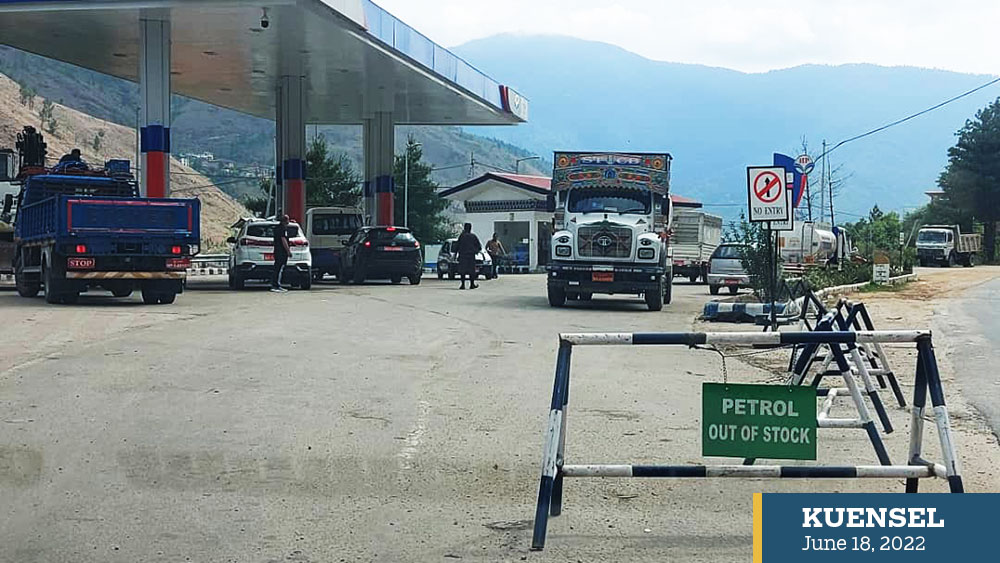Dechen Dolkar
The four fuel dealers in the country have requested the Ministry of Economic Affairs (MoEA) to keep the old domestic fuel pricing module.
The dealers, Bhutan Oil Distributor (BOD), Damchen Petrol Distributor, Druk Petroleum Limited, and State Trading Corporation of Bhutan Limited (STCBL), appealed to the MoEA secretary and submitted a letter last week.
Dealers claim that the government revised the domestic fuel pricing module without their consultations. They say that with the new pricing module, their businesses are running into losses.
With the earlier pricing module, there were 11 components, out of which three are for the government revenue. Three components include green tax, sales tax and depot surcharges.
With the new pricing module, the ministry has removed five components, which include working capital, product loss, financial cost, operating cost, and transit insurance.
However, the dealers’ commission has been fixed at a rate. In the old pricing structure, dealers used to get 1.5 percent of the cost as commission. Now the commission is reduced to Nu 1 for a litre, which means dealers get Nu 1,000 for 1,000 litres.
The STCBL’s CEO, Tshering Wangchuk, said that when the fuel price increases, dealers have to pay more money to the source, which incurs more interest.
“It’s not that when price increases, the commission also increases,” CEO said.
From the old pricing structures, dealers used to keep a profit of around 5.16 percent of the cost price from diesel. From new pricing structures, dealers are keeping around 3.8 percent of the cost price.
Tshering Wangchuk said that there is 30 percent reduction in their revenue.
Similarly, for petrol, dealers used to keep 6.73 percent of the cost price. In the new price, dealers are keeping about 4.36 percent of the price.
Tshering Wangchuk said that there is a decrease in revenue of Nu 14,000 from a tanker for diesel and Nu 24,000 for petrol.
In a day, STCBL imports an average of five tankers of fuel.
“In a month, their revenue decreased by Nu 2.49M and in a year revenue might decrease by Nu 29.8M,” Tshering Wangchuk said.
In the new pricing structure, transportation charges has increased by 1.77 percent for diesel and 1.89 percent for petrol.
Dealers pay the government for depot surcharge, costing Nu 6000 per tanker for diesel and Nu 7,200 per tanker for petrol.
Tshering Wangchuk said that the government could have deducted from taxes and depot surcharges, not from the dealers’ charges.
“Dealers are losing approximately Nu 80 chhetrum from every litre of fuel. In a year, dealers will lose about Nu 11M,” Tshering Wangchuk said.
Similarly, the deputy managing director of BOD, Melam, said that with the new pricing structure, they are not able to meet the overhead expenses.
In a day, BOD imports an average of 30 tankers worth of fuel.
Tshering Wangchuk said that they have plans to expand the fuel retail outlet in the country and if losses continue they will not be able to expand the outlet.
The STCBL incurred a loss of Nu 3.3M in 2020. The profit for the year 2021 was Nu 3.94M from a business of Nu 1.03B.
He said that the net profit was only 0.4 percent despite a dealership commission of 1.5 percent.
“Our estimate after the recent fuel pricing shows that the company will not be able to sustain even its day-to-day operations,” Tshering Wangchuk said.
Meanwhile, the official from the Department of Trade said that the dealers are supposed to stock fuel to last for two weeks but in recent cases dealers had stock to last for less than a week. “So some charges given are unnecessary,” an official said.
The MoEA secretary, Karma Tshering, said that the ministry is carrying out a review on the dealers’ proposal.
Fuel price hike
From mid-night of June 16, the fuel prices soared, setting a new record.
In Thimphu today, a litre of petrol costs Nu 100.32 which is an increase of Nu 3, and diesel costs Nu 115.70, an increase of Nu 12.7 from June 15.
Trade officials said that the price has increased from the source.
Petrol was running out of stock in outlets in Thimphu yesterday.
Dealers said the fuel will reach the outlet only by midnight.
“People have begun hoarding,” dealers said.


